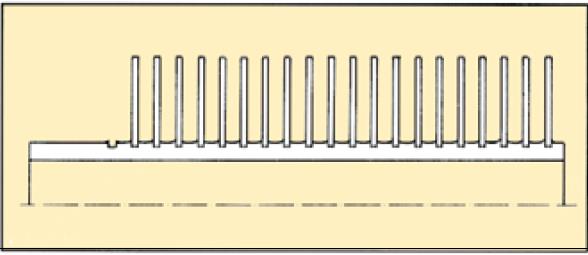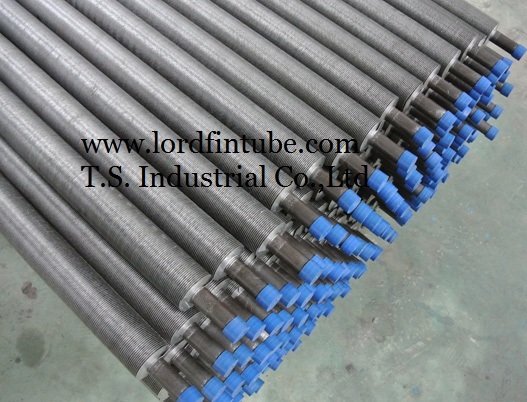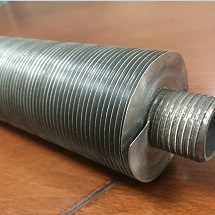Products Description
What is embedded finned tube?
Embedded Fin tubes also called G type Finned tube. Embedded finned tube provides a perfect connection between the fin and the tube. The Embedded Fin tubes main design is that through professional equipment groove the tubes and fin insert fins into the helical groove. Finally combined the fin and tube as integral. Embedded Fin tubes can be used in higher temperatures and are very durable. Embedded fin tubes are best suited for the usages that involve high thermal cycling or high temperatures and where the fin side will be subjected to regular cleaning.

Embedded Finned Tube Typical Size:
|
Base Tube O.D (mm) |
Base Tube Thickness (mm) |
Fin Height(mm) |
Fin Thickness(mm) |
Fin Pitch(mm) |
|
15.88 mm ~50.8 mm |
1.0 mm ~3.0 mm |
6.35 mm ~ 25.4 mm |
0.3 mm ~0.5 mm |
2.1 mm ~ 6.0 mm |
|
Base Tube Material |
Fin Material |
Tube Length (Mtr) |
||
|
Carbon Steel ,Alloy Steel ,Stainless Steel |
Aluminum, Copper |
≤ 21Mtrs |
||
Whats the embedded finned tube applications?
Embedded finned tubes have various applications in heat transfer systems where enhanced heat exchange efficiency is desired. Some common applications include:
1. Heat Exchangers: Embedded finned tubes are widely used in heat exchangers for industries such as HVAC, refrigeration, power generation, chemical processing, and oil and gas. They provide increased surface area, which improves heat transfer between two fluids, such as in air-to-air or liquid-to-liquid heat exchangers.
2. Air Cooled Heat Exchangers: Embedded finned tubes are utilized in air-cooled heat exchangers (ACHE) where cooling is achieved by passing air over the finned tubes. These applications can be found in power plants, refineries, petrochemical plants, and other industrial facilities.
3. Radiators: Automotive radiators often employ embedded finned tubes to enhance the heat dissipation from the coolant circulating through the tubes. The fins increase the surface area in contact with the air, resulting in efficient cooling.
4. Condensers and Evaporators: Embedded finned tubes are commonly used in condensers and evaporators of refrigeration and air conditioning systems. They facilitate heat transfer between the refrigerant and the surrounding medium, improving the overall performance of the system.
5. Waste Heat Recovery: Embedded finned tubes can be employed in waste heat recovery systems, where heat from industrial processes or exhaust gases is captured and utilized for other purposes. The enhanced heat transfer provided by the fins improves the efficiency of heat recovery.
6. Boilers: In boilers, embedded finned tubes can be utilized to increase heat transfer efficiency and improve overall performance. They are commonly found in industrial boilers used in power plants, refineries, and other large-scale applications.
7. Process Heating and Cooling: Embedded finned tubes find applications in various process heating and cooling systems where efficient heat exchange is crucial, such as in chemical processing plants, food processing, and pharmaceutical industries.
Embedded finned tube manufacturing
Embedded finned tube main characteristic
1. Embedded finned tube Max. Working Temperature: 400 °C
2. Embedded finned tube Atmospheric Corrosion Resistance: OK
3. Embedded finned tube Mechanical Resistance: Poor
4. Fin and bare tubes connect tight than normal tension wound on edge fin type
Embedded finned tubes offer solutions where higher temperatures, continuous thermal cycling and tube vibration due to high velocity air streams can cause failures. The fin is mechanically embedded into a groove that is plowed in the tube O.D. and is locked into place by rolls that force the groove to tightly close around the fin base. Embedded finned tubes are commonly used in applications with metal temperatures up to 750 degrees Fahrenheit.
In order to forward you a promt offer we would be pleased to receive you detailed enquiry including:
• Base tube material
• Base tube size (OD x WT x Length)
• Fin material
• Fin type
• Fin diameter or height
• Fin thickness
• Fins per inch, meter or fin pitch
• Lenght of plain, unfinned ends
• Finned Tube Quantity
(Additional fabrication, such as bend or weld the tubes into tubeplate or assembly)



